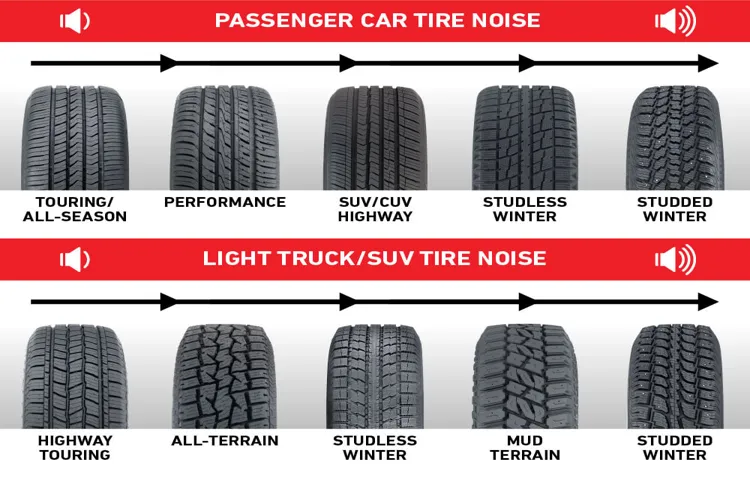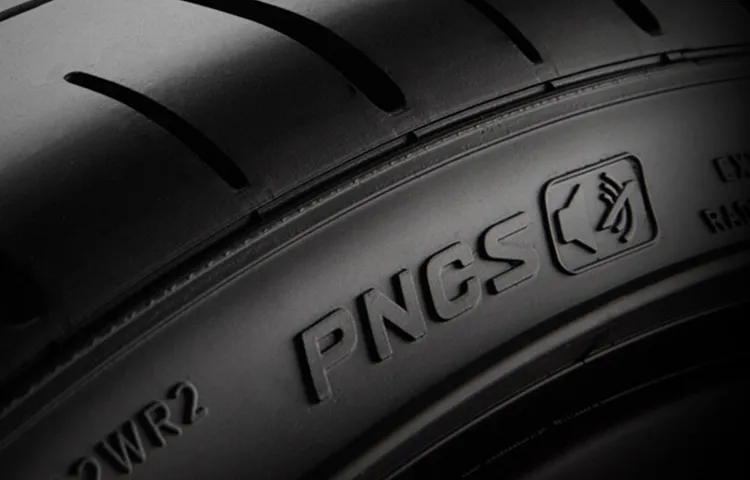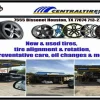Have you ever been driving on a peaceful countryside road, and suddenly the tranquility is disrupted by the deafening sound of your tires? You’re not alone! It’s a common problem that affects many drivers, but luckily, there’s a solution to help restore the calm. Enter the science of quiet tires – a perfect balance between safety, performance, and comfort. But what makes a tire quiet, and how does it affect your driving experience? The answer lies in the tire’s construction, tread pattern, materials used, and the way it interacts with the road.
When a tire rolls, it creates friction that generates noise. A quiet tire has been designed to minimize that noise and reduce vibrations, resulting in a smoother and quieter ride. The benefits of quiet tires go beyond just reducing noise levels.
They also improve fuel efficiency, enhance handling and stability, and extend the life of your tires. That’s because a quieter tire means fewer distractions and a more comfortable ride, which can reduce driver fatigue and increase overall safety. In summary, the science of quiet tires is the art of balancing performance, comfort, and safety to give you a quieter and smoother ride.
So, if you’re tired of dealing with loud and obnoxious road noise, consider investing in a set of quiet tires. Your ears (and your passengers) will thank you!
Table of Contents
Noise Frequency and Pitch
When it comes to tire noise, frequency and pitch are two factors that determine whether a tire is quiet or not. The frequency of noise is how often the sound waves occur and is measured in Hertz (Hz). A tire that produces high-frequency noises can be quite annoying and disturbing to passengers.
On the other hand, low-frequency noise can cause vibrations and make the ride less comfortable. Pitch is also an important factor that affects tire noise. It refers to the perception of how high or low a sound is and depends on the frequency of sound waves.
A tire that produces high-pitched sounds can be more unpleasant than one that produces lower tones. So, what makes a tire quiet? It’s a balance between low-frequency noise and a low-pitched tone. A tire that generates more low-frequency sounds and a lower pitch is considered quieter than the one making more high-frequency and high-pitched sounds.
How Different Frequencies Impact Tire Noise
Tire noise is often a significant issue for drivers, and scientists have been working on understanding how different frequencies and pitches affect the sound produced by car tires. One thing they have found is that the pitch of tire noise is related to the frequency at which the sound waves travel. High-frequency sounds are typically described as having a higher pitch than low-frequency sounds.
When it comes to tire noise, higher frequencies tend to be associated with a sharper, more annoying sound, whereas lower frequencies produce a deeper rumble. This means that the pitch of tire noise can significantly impact how drivers perceive and react to the sound. To mitigate excessively noisy tires, manufacturers are working on developing new technologies that reduce the levels of high-frequency noise while maintaining good traction and ride comfort.

The Importance of Tread Pattern
When it comes to choosing the right type of tire for your vehicle, the tread pattern is a crucial factor to consider. Not only does the tread pattern affect your vehicle’s performance in different weather conditions, but it also plays a significant role in noise frequency and pitch. The pattern of the tread affects the noise generated by the tire on the road surface.
Experts also refer to it as tire noise or road noise. Every tire generates a different type of sound according to its tread design. Smooth tires are the quietest, whereas aggressive patterns are noisier.
The pitch of the noise, which is a crucial factor in the tire’s noise level, depends on the tread pattern’s block size and the distance between each block. The larger the block size and the wider the gaps, the higher the noise pitch. These factors are essential to consider when selecting the right tires for your vehicle.
Materials Make the Difference
When it comes to the quietness of a tire, the materials used in its construction play a significant role. Tires that minimize or eliminate road noise have special tread patterns and specific rubber compounds. The right combination of materials reduces the vibration and friction that create noise, providing a peaceful driving experience.
For example, tires with a softer compound will provide a smoother and quieter ride. On the other hand, harder tires are more prone to creating noise due to increased friction between the tire and the road. Tread patterns also play a crucial role in sound reduction.
Tires with a more substantial tread block tend to be louder compared to those with less significant blocks or none at all. The design allows for reduced air gaps and slapping, which further helps to lower the noise levels. In conclusion, when searching for a quiet tire, consumers have to consider the materials used in the construction, including the rubber compound and tread design, to ensure the best option for their vehicle.
Rubber Compounds and Noise Reduction
Rubber compounds play a crucial role in reducing noise. The right combination of materials can significantly decrease unwanted sound, making it possible for humans to live and work in relative peace. However, not all rubber compounds are created equal, and choosing the right one can be a challenge.
The key to success is understanding your specific noise reduction needs and selecting a compound that meets them. Some rubber compounds work better for reducing impact noise, while others are more effective at handling airborne sound. Additionally, factors like the temperature and the surface area of the space can impact the effectiveness of a particular compound.
In short, when it comes to noise reduction, materials make the difference. By carefully selecting the right rubber compound for your needs, you can enjoy a quieter, more peaceful environment that feels more comfortable.
The Impact of Tire Size and Weight
When it comes to selecting tires for your vehicle, there are a lot of factors to consider. One of the most crucial is the tire size and weight, as these can have a significant impact on your car’s performance and fuel efficiency. The materials used to construct the tire can make all the difference.
For example, tires made from a harder compound will likely be more durable and have a longer lifespan, but they may not provide the same level of grip or traction as softer tires. Additionally, tire weight can directly affect how much fuel is consumed in your vehicle. Heavy tires can increase rolling resistance, which can negatively impact fuel efficiency and overall performance.
Overall, it’s essential to carefully consider tire size and weight when choosing new tires for your vehicle, as it can have a significant impact on how your car handles and operates on the road.
The Role of Air Pressure
Air pressure has a significant role to play in various aspects of life, including weather patterns, aviation, and even physical health. When it comes to materials, air pressure can make all the difference. The amount of pressure, both from internal and external sources, can affect the shape, durability, and overall performance of an object.
For example, a basketball with less air pressure will feel softer and have less bounce, while one with more air pressure will feel firmer and have a higher bounce. Similarly, tires with low air pressure will wear out faster and have worse traction, while those with proper air pressure will last longer and provide better control. Therefore, it’s crucial to maintain appropriate air pressure levels for any object that requires it.
Whether it’s a basketball, tire, or even a balloon, the right air pressure can make all the difference in terms of performance, safety, and longevity.
Putting It All Together
When it comes to tires, one of the most important factors to consider is noise level. So, what makes a tire quiet? It’s a combination of factors. The tread pattern, rubber compound, and overall construction of the tire all play a role in determining how much noise it produces.
Tread patterns with less aggressive designs tend to produce less noise, as they create less friction with the road. Meanwhile, rubber compounds that are softer and more flexible can absorb more shock from the road, reducing vibrations and noise. Finally, the overall construction of the tire, including its shape and thickness, can impact noise levels as well.
By considering these factors and choosing a tire that prioritizes quietness, you can enjoy a more peaceful driving experience.
Factors that Contribute to Quiet Tires
Putting It All Together – Factors That Contribute to Quiet Tires When it comes to quiet tires, there are several factors that contribute to it. The type of tire you choose can make a big difference. Low-profile tires may look great, but they tend to be noisier due to the decreased amount of rubber between the road and your wheels.
On the other hand, tires with more rubber are often quieter but may not be as sporty looking. Additionally, the tread pattern can also play a significant role. Tires with large, aggressive tread patterns tend to generate more noise.
In contrast, tires with a smoother tread design can reduce noise levels. Finally, the overall quality of the tire can make a difference in road noise. Top-tier brands invest heavily in research and development to create tires that perform well across a variety of driving conditions.
These tires incorporate innovative technology, such as noise-canceling technology, that dampens road noise. It’s important to do your research before making a purchase and determine which tire features matter most to you. By considering all of these factors, you can select the right tire for your vehicle that will provide a quiet driving experience.
Choosing the Right Tire for a Quiet Ride
When it comes to choosing the right tire for a quiet ride, the process can seem overwhelming. However, by considering important factors such as tread pattern, tire size, and noise reduction technology, drivers can make an informed decision that provides a smooth and quiet driving experience. It’s important to select a tire with a tread pattern that is designed to reduce noise, such as one with multiple small tread blocks as opposed to a larger singular block.
Additionally, choosing the correct tire size for a vehicle can also have an impact on reducing noise. Lastly, opting for tires with noise reduction technology, such as foam insulation or noise-absorbing materials, can further minimize road noise. By putting all of these factors together, drivers can be sure to choose tires that maximize the enjoyment of their daily commute without compromising performance or safety.
Conclusion: Enjoying a Smooth, Quiet Drive
In summary, a quiet tire is like a well-behaved child – it doesn’t make unnecessary noise and isn’t a nuisance to those around it. Just like a well-behaved child, a tire’s quietness comes down to its composition and design, with factors such as the tread pattern, tire shape, and material all playing a role. So, the next time you’re enjoying a peaceful drive, spare a thought for the humble tire, quietly doing its job without causing a fuss.
“
FAQs
What factors contribute to tire noise?
Tire noise is influenced by several factors, including the type and quality of the tire, the road surface, the speed of the vehicle, and the vehicle suspension system.
How can tire tread affect noise?
The tread pattern and depth can impact tire noise. Tires with deeper treads and wider grooves generally produce less noise than those with shallower treads and smaller grooves.
Can tire pressure affect noise levels?
Yes, underinflated or overinflated tires can cause increased tire noise. It’s important to always maintain the recommended tire pressure for your vehicle.
What is the impact of tire size on noise?
Tires with larger diameters and wider widths generally produce more noise than those with smaller diameters and narrower widths.
How can tire maintenance impact noise levels?
Regular tire maintenance, such as rotating and balancing tires and ensuring proper wheel alignment, can help reduce tire noise.
Are there any tire brands that are known for producing quiet tires?
Yes, some tire brands, such as Michelin, Continental, and Bridgestone, are known for their quiet tire designs.
Can a wheel alignment issue cause increased tire noise?
Yes, if the wheels are not properly aligned, it can cause uneven wear on the tires, leading to increased noise levels.



